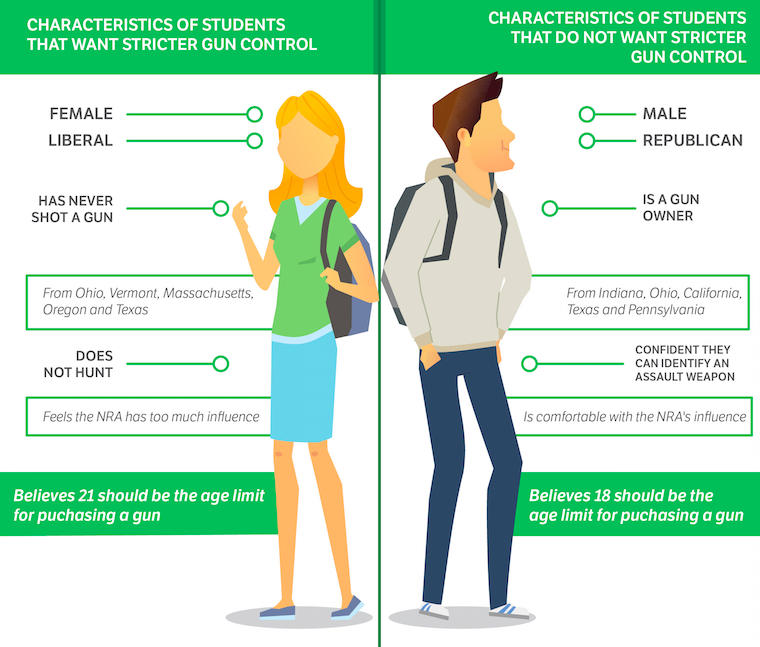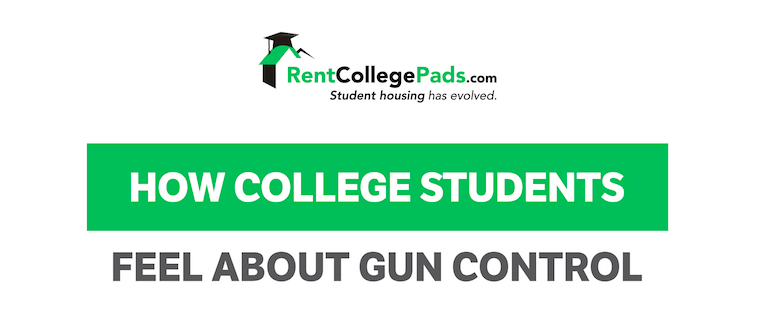Las Vegas. Stoneman Douglas. Sandy Hook. Santa Fe High. The Youtube headquarters. These seemingly unrelated locations have been forever tied by a grim thread that runs through American culture -mass shootings. As of early 2018 there have been 1,624 mass shootings in the last 1,870 days. Crunch some numbers and that data gets even darker: roughly 86 percent of all days in the past five years have had a mass shooting.
Sadly, it’s a trend that isn’t slowing down: just months after the Stoneman Douglas High School victims organized popular social media campaigns like #NeverAgain and #MarchForOurLives, there have already been more shootings in places like Maryland and Texas.
There’s no clear winner when it comes to addressing proper gun use in America. But despite the complexity of gun laws, the conversation has been steered by younger Americans -those under 25 -in the wake of the Las Vegas and Stoneman Douglas shootings. While high school students participated in marches and walkouts, we surveyed thousands of college students from around the country and gathered their responses regarding American gun control and gun culture.
We asked college students about their political affiliation, gender, and history with gun ownership and usage to examine how these factors influenced their opinions on guns and America’s relationship with firearms.
While the data doesn’t include every aspect that might influence college students, our research suggests that student opinion can be largely predicted by two factors: their self-reported political party affiliation, and whether or not they own a gun. This information seems to influence student thought on most subjects, including how strict gun laws should be, how mental health influences gun ownership and use, and whether the US even has a gun violence problem.
Students on Gun Control: Banning & Restriction

Left Side: Liberal (Democrat) Middle: Centrist (No Affiliation) Right Side: Conservative (Republican)
First, we wanted to figure out how much students felt about assault weapons. We did this by asking two questions:
- Do you know what assault weapons are?
- Should assault weapons be banned?
87% of self-identified liberal survey respondents said assault weapons should be banned, compared to only 18% of self-identified conservative survey respondents. However, only 50% of liberals respondents surveyed were confident they could identify what an assault rifle is, compared to 78% of conservative respondents.
After asking these primer questions, we collected data on the most controversial issue surrounding guns: should gun control be more strict or less strict? The results largely played out along party lines. 96% of self-identified liberal respondents were in favor of more strict control compared to only 24% of conservatives.
But what about that sliver of liberal students who didn’t support stricter gun laws? We found that, of the 4% of anti-gun control liberals, 79% had shot a gun at some time in their life.
The data forced us to consider an interesting question: does shooting a gun give Americans the confidence to consider loosening restriction laws?
Those Who Have Shot A Gun Feel Different About Guns Than Those Who Haven’t

Left Side: Liberal (Democrat) Middle: Centrist (No Affiliation) Right Side: Conservative (Republican)
People are more inclined to feel safe when they think they’re in control of a situation. But this gut feeling can sometimes lead us astray: while many Americans feel more comfortable driving a car than riding an airplane because of the control it gives them, they’re actually far better off in the sky. This sense of control may have similarly influenced students who reported shooting a gun at some point in their life.
Out of 1,185 total respondents, only 27 Republican students said that they had never shot a gun. Among those 27, 17 were in favor of stricter gun control, whereas a whopping 82% of those who had shot a gun were not in favor. Much like left-leaning students, Republican students who had not shot a gun before were more likely to favor stricter gun control laws.
We took this data one step further to arrive at another conclusion: a significantly higher number of students who identified as Republican had shot a gun at some point compared to those identifying as liberal: 87% to 45%. And among self-identified liberals that own a gun (just seven percent of those who identified as liberal), only 66% favored stricter gun control laws. The outliers on both sides of the political spectrum paint an interesting picture of how gun ownership and gun use molds student opinion on gun restriction.
Perhaps it is the normalcy of guns in the life of conservative families which contributes the most significantly toward the disagreement on whether or not American gun control laws should be amended. One group seems more comfortable around guns, while the other group has little interest in gun use or gun ownership and feels less comfortable around guns.
The Slight Divide Between Men and Women
Beyond the political divide, we looked more specifically at how women and men feel about gun control laws. Female Republicans only slightly oppose more gun control (57%), while female Democrats overwhelmingly favor control (98%). Men do not follow this same pattern. 86% of left-leaning males are in favor of gun control, and 87% of conservative males oppose it.
Similar to our previous data, 85% of male respondents have shot a gun at some point in their lives, compared to 52% of women respondents.
Mental Health and Gun Control
Mental health is always brought up in the context of gun control, but there’s rarely any context or consensus on what poor mental health is, and where the line should be drawn in regard to restricting gun access to mentally unhealthy individuals. We asked students if people treated for depression in the past six months should be eligible to purchase a gun.
Most respondents overwhelmingly responded with “no.” Over 70% of females in each category (Centrist, Democrat and Republican) responded “no.” Democratic-leaning males came in with 71% voting “no”. But Centrist and Republican males were an exception. 49% of Centrist males responded “yes” and said that people treated for depression in the last six months should be allowed to purchase a gun, as well as 51% of Republican males.
Students from both genders and political parties were overwhelmingly against those diagnosed as schizophrenic being allowed to own or purchase firearms. Over 90% of self-reported liberals, conservatives and non-partisan respondents were against allowing schizophrenia sufferers from owning firearms.
In general, most respondents felt that any sign of mental illness was enough to consider renouncing an individual’s right to gun ownership - at least for some period of time. But near-universal agreement on restriction was only agreed upon for mental illnesses that the general public considers more severe.
Since 18% of Americans experience some sort of anxiety disorder every year, it seems as though Republican and Centrist male respondents prefer not to restrict the gun rights of such a sizeable population. But students on both sides of the political aisle largely see schizophrenia, a disorder that impacts 1.2% of the American population, as a condition that necessitates gun restriction.
Conclusions: Does America Have A Gun Problem?
Again, gun ownership seems to influence whether or not students think there is a problem with gun violence in America. Overall, 73% of survey respondents believe America has a problem with gun violence, but among gun owners, only 36% surveyed believe America has a problem with gun violence.
As we saw when we looked at party lines and whether or not students had shot a gun before, male gun owners are more likely to think there is not a problem with gun violence (70%), while female gun owners are more split (46%). In fact, male gun owners and males who have shot a gun in the past are the only two groups surveyed who think America does not have a problem with gun violence.
Therefore, despite America being home to 31% of mass shooters world wide, 27% of students surveyed do not think America has a problem with gun violence.
While this research does not attempt to make any definitive claims, it does demonstrate that two of the most important factors in determining an individual’s views on gun control are party affiliation (and within that, whether or not a person has shot a gun), and gun ownership. Additionally, gender also seems to play a role in shaping college students’ opinions on gun use.
These ideas aren’t revolutionary, but they do explore many of the arguments that both younger and older individuals make when addressing gun control. They also illuminate avenues for further study, which can hopefully be used to address gun violence in the future.
Fair Use
You’re welcome to share the images and data found on this page. Please attribute the authors by providing a link back to this page so readers can learn more about the project and related research.
How College Students Feel About Gun Control:


